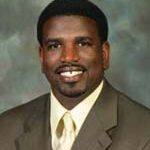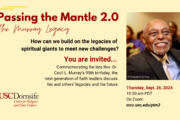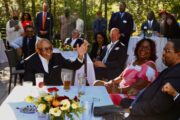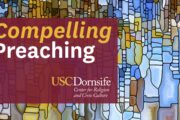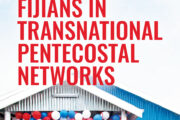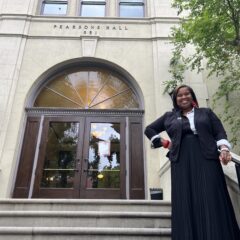In recent months, a group of Gospel music pioneers came to USC to get a peek at the Gospel Music History Archive, a joint project of the USC Digital Library, the Center for Religion and Civic Culture, and the Black Voice Foundation for Media, History and the Arts. The visit was an emotional one for me.
For the past five years, Matt Gainer, Tim Stanton, and Giao Luong, and I have been working to make this project a reality. During that time there have been many fits and starts but the vision to create a high quality digital archive tracing the growth and development of Gospel Music and the expressive culture of the African American church has remained the same.
Coupled with the Pentecostal and Charismatic Research Archive, which will include a substantial set of materials from the Church of God in Christ, GMHA is part of a larger effort by CRCC to chronicle the African American religious experience. For me the work is about giving scholars, congregants, filmmakers, journalists, and the general public access to the materials needed paint a more nuanced picture of Black life in America.
Almost 10 years ago, I set out to write a book about an obscure early Gospel musician named Arizona Dranes. Once I listened to a reissue of her collected works from the Scotland-based Document Records, I was hooked. The best way I can describe her music was to use the term “Gospel Rag.” In terms of instrumentation, a Dranes composition sounds like it came from Scott Joplin, the king of Ragtime. In terms of lyrics, her music is definitely Holiness-Pentecostal.
As I searched to find other links that might help uncover Dranes’ story I ran across a number of other musicians who shared her penchant for confounding the sacred and the secular. Perfecting a genre often referred to by scholars as the “Holy Blues,” I soon found out that other performers such as Utah Smith, Ford Washington McGee, and Blind Willie Johnson all shared the same denominational affiliation as Dranes—they were all members of the Memphis-based Church of God in Christ (COGIC).
Once a peripheral religious group often ostracized for their austere lifestyle, COGIC is now the largest Pentecostal and largest African American Religious denomination in America. When I went to Memphis to view the church archives, I quickly found what I would find when I went to search for documents related to Gospel Music generally, there was no archive.
It was this hurdle that compelled me to first create the Gospel Music History Project and then to approach Donald Miller at CRCC about creating a digital archive focused on Gospel Music. Over the years we have endured administrative changes and a lack of funding, but the GMHA train has kept on chugging along.
With initial funding from the Zumberge Research and Innovation Fund and another grant from the Flora Thornton Foundation we were able to build the archive and begin populating it with content. In addition to song books, photographs, and traditional documents, we were also able to photograph and make audio and digital recordings of individuals and churches central to the music’s development in California.
One of these key pieces was Victory Baptist Church. Located just blocks away from USC at 48th and McKinley, Victory Baptist was a center of both musical and political expression for the throngs of African Americans who settled in the neighborhoods along Central Avenue after World War II. In addition to its legendary Pastor, the Rev. Arthur Atlas Peters, the church was also the first Black congregation to be featured on a weekly local television broadcast. Through its pulpit and choir stands passed some of the most important figures in Black life. Including the likes of Mahalia Jackson and the Clara Ward Sisters, it was from Victory’s pulpit that Martin Luther King Jr. addressed the national media following the assassination of Malcolm X.
The visit to USC included gospel pioneers Edna Tatum (famed Gospel announcer  and host of KPFK’s Gospel Classics), Chicago-based musicians/directors Barbara and Ira Lynn, Seventh Day Adventist Elder Jerry Warren, Bishop L. Daniel Williams (former president of the Los Angeles Baptist Minister’s Conference) and CRCC’s Mark Whitlock (Pastor of Christ Our Redeemer A.M. E. Church). The legendary Rodena Preston, pianist and choir director, also joined the tour. Preston is one of the co-founders of James Cleveland’s Gospel Music Workshop and the sister of pop and soul icon Billie Preston. It was the visual of her mother’s hands, Pianist Robbie Preston, which opened every weekly Victory Baptist television show. To watch her reaction as she viewed the materials related to Victory and the beautiful photographs and compelling video that we created after interviewing her in 2008 was emotional for the both of us.
While I can’t describe what was going on in Ms. Preston’s heart, for me the day embodied all that the GMHA was supposed to be. Scholarly and entertaining, the subject matter was presented in a format that mirrored the deep level of respect that I have for both the music and the people that create it. It was that all too infrequent occurrence when a historical production actually connects with the people and communities that lie at the heart of the story.
Daniel Walker was a research associate with the USC Center for Religion and Civic Culture until 2012.

